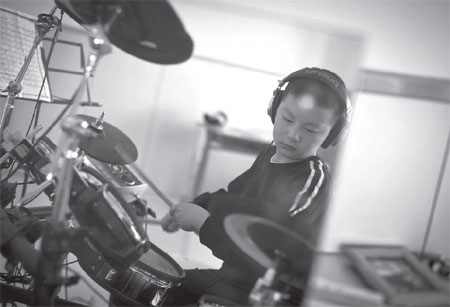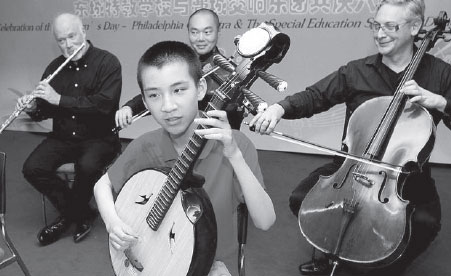Finding their inner music
Updated: 2014-01-29 08:47
By Chen Nan (China Daily USA)
|
|||||||||
Music therapy is gaining wider acceptance in China, as mentally challenged youngsters are exposed to classical music and learn to play instruments in programs that help them find harmony with the outside world, Chen Nan discovers.
Yang Xinli knew that her daughter, Huan'er, was different from other children soon after she was born in 1990. She easily lost her temper, couldn't sleep well and had no eye contact with people. None of that fazed Yang and her family until a psychologist Yang met at a bus stop suggested that her daughter's crying and screaming were not normal.
Yang took Huan'er, who was then 20 months old, to the hospital and was told that her daughter had Asperger syndrome, an autism spectrum disorder.
Shocked and depressed, she went to many hospitals in her hometown of Xi'an, Shaanxi province, and tried every possible treatment to help her daughter.
Two years ago, Yang was introduced to the Xi'an-based KBL Music Therapy Studio. Music therapists there have helped her daughter find a more positive outlet for her emotions through sessions that involve listening to classical music and having her daughter play instruments and sing.
"She makes much more eye contact with me now and she sings well," says Yang, who takes her daughter to such classes twice a week. "She enjoys being part of the group."
Yang hopes that her daughter's progress means she will get a job after graduation a year from now, like "normal" students.
"I am still worried about her future but I hope she will be part of society and enjoy her life," she says.
Such is the potential of music therapy. Ever since a group of Chinese musicians came back from overseas, bringing modern theory and technique back to China in the early 1980s, music therapy has developed fast. It has been used by many hospitals in China, especially in the mental health field, according to Cui Yong, chief doctor of the rehabilitation center of Huilongguan Hospital, which was among the first hospitals in China to embrace it.
He notes that some universities, such as Central Conservatory of Music in Beijing and Northeast Normal University in Changchun, Jilin province, offer a major to train music therapists.
"I can see a growing need for music therapists from the increasing number of people who have come to my studio," says Ma Xiao, 24, who became a music therapy volunteer in Xi'an when he was 18 and later founded KBL Music Therapy Studio in 2011.
His clients range from children with emotional problems, autism and cerebral palsy to students with examination anxiety. Now, three music therapists are working at Ma's studio and they have treated nearly 300 children with the stimulation of sound.
According to the statistics from the Chinese Center for Disease Control and Prevention, more than 100 million Chinese have various forms of mental disorder and 16 million of them are severely mentally ill.
Ma says his father, who is the director of a Xi'an-based public hospital, motivated him to make music therapy his career. After studying the piano at Xi'an Music Conservatory, Ma went to the Central Conservatory of Music in the capital for further training.
Besides helping children with emotional problems, Ma also has cooperated with hospitals in Xi'an, treating cancer patients and women with postpartum depression.
Ma uses the waist drum, a widely used folk instrument of northwestern China.
"Patients feel familiar about the instrument and they have the urge to play it. That's what we want, their active response and participation," says Ma, who uses a mix of improvisation and proven techniques.
Ma says that music therapy is an emerging field in China and many people still know little about it. He is working with Xi'an Music Conservatory to launch a music therapy major.
Sound potential
Gao Tian, one of the first Chinese known to study music therapy abroad, founded the Institute of Music Therapy at the Central Conservatory of Music in 1996.
All individuals have the ability to respond to music and sound, he says, which can lead to positive changes in their behavior and emotional responses. More than 1,500 people have received music therapy training from Gao so far.
"Music has great positive effects for brain activity. It's not a medicine, which cures certain disease," says Gao, who graduated from Temple University in the United States and received his MA degree in 1994. He says the main approaches use singing, instrument playing and language guidance, to encourage people to engage in spontaneous and creative musical activities. "With proper music therapy, people can relieve anxiety and control emotions."
Gao is planning to offer services for seniors in China since the country's aging population is growing rapidly. "It has been proved that music therapy can benefit the elderly with mental health needs, by reducing isolation, promoting memory and healing after stroke," he says.
Wang Chunhong, who has studied music therapy since 1987, says that one challenge is to raise awareness about its benefits and potential. A graduate from Beijing Dance Academy, Wang uses dance and music to treat her clients. More than 2,000 people with mental challenges came to her during the past 20 years.
Born into a family of doctors of traditional Chinese medicine, Wang founded an arts-rehabilitation center in 2000 and combines the theory of TCM with music therapy, an idea documented in the book Art Therapy in Asia in 2012.
Making subways serene
"Music therapy isn't anything new. It was even mentioned in traditional Chinese medicine books," Wang says. "It can be used widely in our daily lives, such as to help people quit smoking and improve sleeping quality."
Since Jan 7, the National Center for the Performing Arts has sponsored a music program in Beijing's subway stations. Classical music is played at five different time periods every day, between 5:30 am and 10:30 pm. The music reaches a total of 160 stations on 10 lines.
Wang Chunqiang, an official with the Beijing Municipal Commission of Transport, was quoted saying that "music creates a good environment for passengers and relieves their anxiety."
Cui Yong, who is also the board chairman of the Chinese Music Therapy Association, says that at first music therapy in China was limited to playing music to patients.
"Now we have a broader vision thanks to some professional music therapists, like professor Gao, who has brought the modern theory and methods to China during the past two decades," he says.
He also says that the practice should be standardized in China. With nearly 300 registered members, who are mostly working in the music therapy-related fields, he says that the association plans to map out a professional certification system.
"Some people learn music therapy from some private training organizations, which are not professional and cannot meet the needs of the patients," Cui says. "Music therapy is still at the beginning stage in China, and it takes time for it to develop and become mature."
Contact the writer at chennan@chinadaily.com.cn.
|
Chao Chao, a fourth-grader with autism, practices electronic drums for a performance at Beijing Guomei Jiayuan Primary School. Liu Bin / Xinhua |
|
Gao Yuxuan, a boy with autism, performs with musicians from the Philadelphia Orchestra during a celebration of International Children's Day in 2012. Jiang Dong / China Daily |
(China Daily USA 01/29/2014 page9)
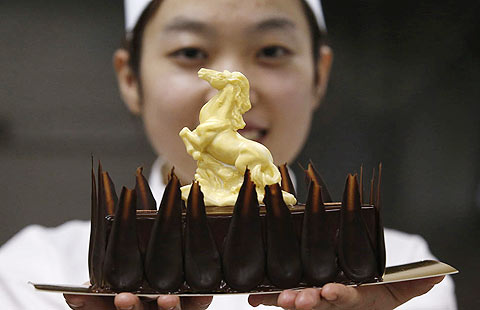
 China welcomes Year of the Horse
China welcomes Year of the Horse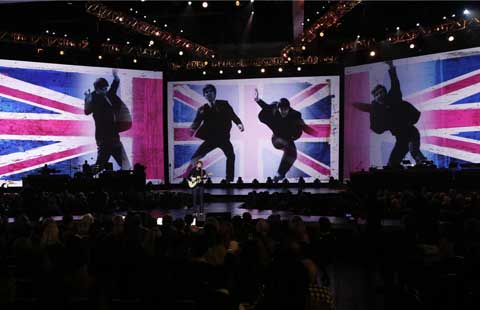
 Musical celebration of Fab Four anniversary
Musical celebration of Fab Four anniversary
 Nice day for a cool white wedding
Nice day for a cool white wedding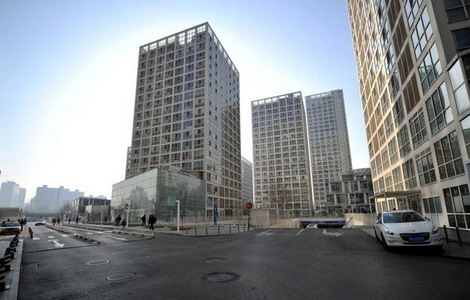
 Home-bound workers ease crowding in Beijing
Home-bound workers ease crowding in Beijing
 Putin pays tribute to Siege of Leningrad victims
Putin pays tribute to Siege of Leningrad victims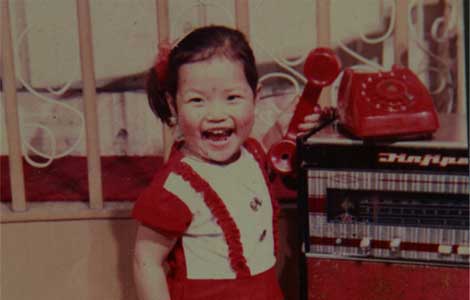
 Chinese ace Li Na before she was famous
Chinese ace Li Na before she was famous
 Xi visits soldiers on frozen northern border
Xi visits soldiers on frozen northern border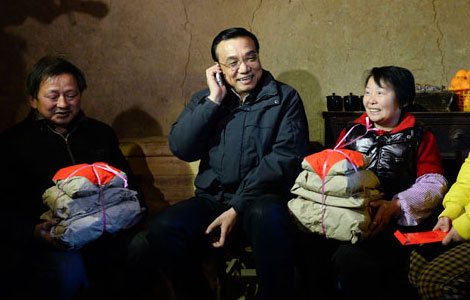
 Premier calls for action to relieve poverty
Premier calls for action to relieve poverty
Most Viewed
Editor's Picks

|
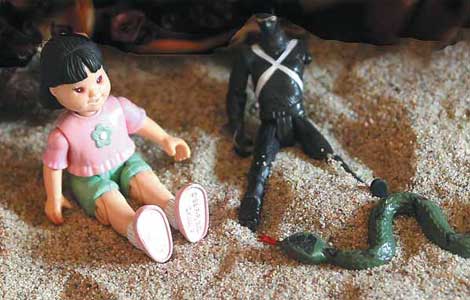
|

|

|

|

|
Today's Top News
China-themed malls a new trend in the Bay area
Replace dollar with super currency: economist
Japan should learn from Germany
Bird flu prompts countermeasures
Hotline on way for Chinese abroad
South China Sea archives open in Hainan
Some good advice for Japan on comfort women
US, UK in app-tapping scandal
US Weekly

|

|
